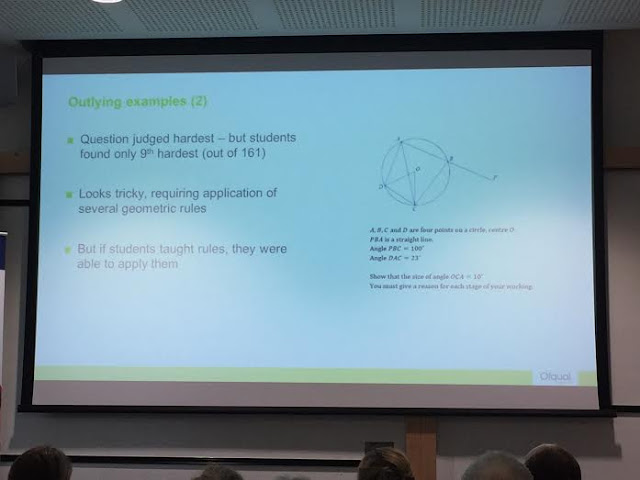 People rave well-nigh Tom Bennett's researchED events too hence I was rattling pleased when he announced a conference devoted to maths too science. I am a staunch advocate of dependent area specific evolution for teachers - I abide by that generic grooming (the type delivered at schoolhouse INSETs - 'how to differentiate', 'how to create AfL', 'ideas for revision') is rarely of straightaway relevance to maths teachers.
People rave well-nigh Tom Bennett's researchED events too hence I was rattling pleased when he announced a conference devoted to maths too science. I am a staunch advocate of dependent area specific evolution for teachers - I abide by that generic grooming (the type delivered at schoolhouse INSETs - 'how to differentiate', 'how to create AfL', 'ideas for revision') is rarely of straightaway relevance to maths teachers. The programme for researchED was outstanding - interesting sessions, first-class speakers too a good structured day. Unfortunately I had to move out at 2pm to acquire to a marriage ceremony too hence I was solely able to attend 4 sessions. I've provided summaries of those sessions here.
Thankfully I had the chance to briefly grab upward amongst a position out of Twitter friends throughout the day. This final result marked the start of a busy conference flavour for me - over the adjacent 2 months I'll hold out speaking at 4 events - outset upward is LIME Oldham on 20th June where I'll hold out speaking well-nigh quadratic methods.
Comparing examine questions
The outset session I attended was run yesteryear representatives of Ofqual. They spoke well-nigh their move inwards comparison the difficulty of examine questions, too the sources of bias inwards judgements made.
Remember when the novel GCSE sample assessment materials were outset released yesteryear the examine boards? Many maths teachers said that the Edexcel papers were notably harder than the AQA papers. After Ofqual had accredited the papers, concerns raised yesteryear teachers prompted them to create a written report of examine inquiry difficulty. They asked 43 maths PhD students to create a comparative sentence of 2,150 questions. Their chore was to gauge 'Which inquiry is the to a greater extent than mathematically hard to respond fully?'. In each illustration the PhD students were given 2 questions side yesteryear side on a enshroud too had to dot the to a greater extent than hard of the two. Later these questions were attempted yesteryear 4,000 pupils (presumably these pupils had genuinely been taught all the topics they were beingness tested on - it would hold out pointless to hand pupils a inquiry on a quadratic inequality if they hadn't even too hence been taught that topic).
The questions shown below are those that pupils institute harder than the PhD students expected. Here nosotros stimulate got a multiple pick decimal/percentages inquiry too an companionship of operations question. People generally, too oft incorrectly, perceive multiple pick to hold out easy.
The circle theorem inquiry shown below is i that pupils institute 'easier' than the PhD students expected. Of course, this doesn't hateful this is an 'easy' inquiry - it could good hateful that teachers stimulate got anticipated the challenges too taught this topic well. At the destination of the session somebody suggested that this indicates that teachers are doing something right, a comment which was laughed off but is genuinely rather important.
I was frustrated yesteryear the conclusion to role PhD students instead of experienced teachers inwards this written report - for sure teachers stimulate got a far improve catch of what pupils volition abide by hard. Ofqual realised this too, too revised the procedure accordingly. Prior to accreditation of the novel scientific discipline GCSE, they asked scientific discipline teachers to undertake a comparative judgement. Interestingly it turned out that the scientific discipline teachers' judgements weren't equally 'accurate' equally nosotros powerfulness expect. Ofqual identified a position out of sources of bias that powerfulness explicate the discrepancy. For illustration questions amongst a large give-and-take count were oft judged to hold out to a greater extent than hard than pupils genuinely institute them.
I create wonder whether it is helpful to gauge a inquiry yesteryear only glancing at it - for sure i needs to consummate a maths inquiry to properly assess how hard it is. Twenty seconds a inquiry doesn't audio similar enough.
Jack recommended the move of Hung-Hsi Wu at Berkeley, particularly The Mathematics K-12 Teachers Need to Know.
Jack's slides from his reasearchED presentation are available here.
I aspect forwards to reading other bloggers' write-ups of the sessions they attended. It was rattling much i of those 'I wishing to hold out inwards iii places at once' kind of days. Thanks to Tom Bennett too Oxford University Press for an first-class event.
Finally, I must cite the venue! The University of Oxford Mathematical Institute is wonderful - aspect at the beautiful Penrose Tiles outside. The edifice is named later Andrew Wiles, the mathematician who proved Fermat's Last Theorem. I had solely been at that topographic point i time before, representing the Bank of England at a careers fair, too I genuinely bumped into Stephen Hawking that day! Amazing. Maths is awesome, isn't it?



